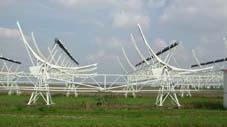 |
|
BEST (Basic Element for Ska Training)
The scientific whole world community is designing a new radiotelescope
generation: the SKA
(Square Kilometer Array). It will have 1 million square meters of collecting
area and an operating bandwidth for sky observation, spanning from 0.1
up to 25 GHz. SKA
will be a technological giant and it is going to answer the unsolved problems
of the modern astrophysics. To reach definitive design of SKA, all the
research institutes of the world are designing new technologies and developing
new algorithms to be tested on "test bed antennas". The Italian
demonstrator called BEST (Basic Element for Ska Training) exploits the
large collective area of the Northern
Cross Antenna located in Medicina (BO). Due to the high sensibility,
the Northern
Cross Antenna offers the possibility to realize also science.
BEST project is structured in 3 main steps described below:
1. BEST-1: 4 receivers were installed on a
cylindrical reflector of the North-South arm (Ag = 176 m2).
2. BEST-2: 32 receivers were installed on
8 cylindrical reflectors of the North-South arm (Ag = 1410 m2).
3. BEST-3lo: 18 receiver were installed on
a part of the East-West arm (Ag = 800 m2).
For the future more receivers could be installed on the whole Northern
Cross Antenna (BEST-ione project: BEST-Italian Observatory for New
Experiments), but this expansion is not foreseen for the actual projects.
SKA project is coordinated by ISSC (International SKA Steering Committee).
In 2012 a final SKA prototype will be realized and the construction of
the final version will be prepared. All the research institutes of the
world (Europe, South Africa, Australia, Canada, China, India, United States
of America) are involved to study and to realize the following tasks:
· Antennas
· Front-end
· Optical Links (analogue and digital)
· Digital receivers
· Beam-forming algorithms
· Post-processing algorithms
· Calibration
BEST project took part of the European program SKADS (SKA Design Studies). It started since the middle of 2005 and finished at the end of 2009. It shared all the scientific and technological concepts in which are involved a large number of countries (Italy, Holland, France, England, Germany, Russia, Spain, Poland and Sweden).
|
|
||||||||||
 |
 |
 |
 |
 |
||||||